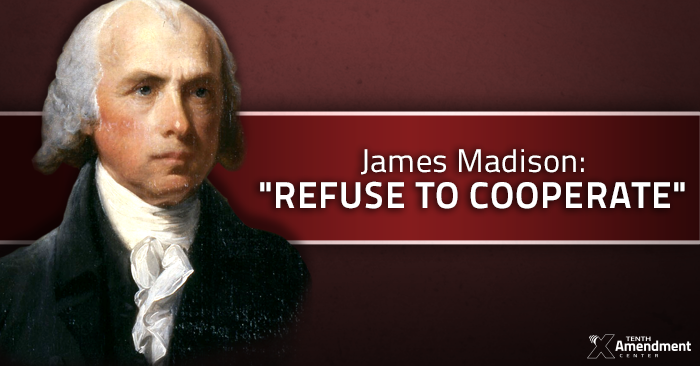From a great site - The Tenth Amendment Center
Excerpts:
The Supreme Court has long held that states do not have to be active participants in the enforcement or effectuation of federal acts or regulatory programs.
The basis for what is now known as the legal doctrine of “anti-commandeering” was the advice of James Madison, writing in Federalist #46. There, he advised four primary tactics for individuals and states to effectively push back against federal overreach, including a “refusal to cooperate with officers of the Union.”
The following are the four landmark cases where the Court has upheld this doctrine.
In Prigg v. Pennsylvania (1842), Justice Joseph Story held that the federal government could not force states to implement or carry out the Fugitive Slave Act of 1793. He said that it was a federal law, and the federal government ultimately had to enforce it:
The fundamental principle applicable to all cases of this sort, would seem to be, that where the end is required, the means are given; and where the duty is enjoined, the ability to perform it is contemplated to exist on the part of the functionaries to whom it is entrusted. The clause is found in the national Constitution, and not in that of any state. It does not point out any state functionaries, or any state action to carry its provisions into effect. The states cannot, therefore, be compelled to enforce them; and it might well be deemed an unconstitutional exercise of the power of interpretation, to insist that the states are bound to provide means to carry into effect the duties of the national government, nowhere delegated or instrusted to them by the Constitution.
In New York v. United States (1992) the Court held that the regulations in the Low-Level Radioactive Waste Policy Amendment Act of 1985 were coercive and violated the sovereignty of New York, holding that “because the Act’s take title provision offers the States a ‘choice’ between the two unconstitutionally coercive alternatives–either accepting ownership of waste or regulating according to Congress’ instructions–the provision lies outside Congress’ enumerated powers and is inconsistent with the Tenth Amendment.”
Sandra Day O’Connor wrote for the majority in the 6-3 decision:
As an initial matter, Congress may not simply “commandee[r] the legislative processes of the States by directly compelling them to enact and enforce a federal regulatory program.”
She later expounded on this point.
READ MORE/DOWNLOAD PDF DOCUMENT->







